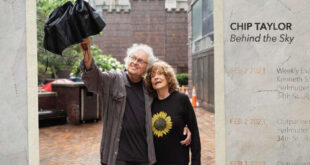
Classic Stage Company‘s bracing, timely new production of Gotthold Ephraim Lessing’s 1779 comedy-drama Nathan the Wise stars F. Murray Abraham in the title role. If this didn’t risk insulting the Oscar-winning actor’s long-running body of fine work on stage and screen, I’d venture to suggest that this fictional Jewish merchant of Crusader-era Jerusalem – said to have been inspired by Lessing’s friend, the philosopher Moses Mendelssohn – was the role Abraham was born to play.
Lessing was a German theatrical innovator and champion of the Enlightenment. In this, his last play, he wrapped a powerful humanistic statement in the robes of a secret-identity storytelling marathon, written in verse and playing out over more than four hours. Directed by Brian Kulick in a sharp and sharply compressed 21st-century translation by Edward Kemp, CSC’s production succeeds brilliantly at, in Kemp’s words, making “Lessing’s arguments immediate and accessible to the audience on one hearing…to make the play’s dialectic more theatrically alive and more actively inhabited by the characters – and to make it a manageable evening in the theatre.”
Over a very manageable two hours and 10 minutes, a uniformly excellent cast hits home with Lessing’s then (and still) controversial view of religion: that no faith has the uniquely true message of God; they are all equally valid paths to goodness, grace, godliness, or whatever you choose to call it.
The year is 1192. The great sultan Saladin (Austin Durant) rules Jerusalem and most of the Holy Land while Frankish Crusaders control a part of the coastline, but peace reigns for a few precious years. Nathan, a wealthy merchant with a marriageable daughter, Rachel (Erin Neufer), returns from a trading trip to learn two pieces of interesting news: his young Muslim friend and chess companion, the dervish Al-Hafi (a crafty, winning performance by George Abud), has joined the sultan’s inner circle as treasurer; and Rachel has been rescued from a fire by a mysterious young Knight Templar (a raw, powerful turn by Stark Sands of Kinky Boots fame).
The Templar was on the scene only because the sentimental sultan had spared his life on spotting a strong resemblance between the young German and Saladin’s long-dead brother. Could this likeness be more than coincidence? The Templar is not the only one who doesn’t know his own true identity.
But before the soap-opera revelations come the ideas. Nathan discovers that both Saladin and the Templar share his (read: Lessing’s) enlightened philosophy, a tolerant, hopeful take on humanity’s potential for working through differences to create a more peaceful world.

Yes, these characters seem anachronistically enlightened. But keep in mind that Lessing was avoiding censorship by “hiding” his ideas in a “harmless” work of entertainment.
Textured by strong performances all around, the production smoothly balances the story’s personal and philosophical aspects. Also good are Shiva Kalaiselvan as Saladin’s steely sister Sittah, and Caroline Lagerfelt as Daya, an older Christian woman who has been a companion to Rachel all the girl’s life. (Though that brings me to the one flaw with the production: it’s not clear what Daya’s relationship with Nathan is, or with Rachel for that matter. Reading a synopsis of the original text left me even more confused about what this version intends – here she’s a mother-figure to Rachel and a companion of some sort to Nathan, but what?)
With a scene of Islamic prayer, Arabic writing projected against a backdrop, depiction of casual bigotry toward Jews, and above all, a message of tolerance and the double historical perspective of an ancient setting and 18th century composition, this Nathan the Wise is more than a superb entertainment. It’s a small beacon of light in a dark world, running through May 1 at Classic Stage Company, 136 E. 13 St., NYC. Tickets are available at the website or by calling OvationTix at 866-811-4111.
 Blogcritics The critical lens on today's culture & entertainment
Blogcritics The critical lens on today's culture & entertainment



